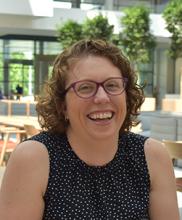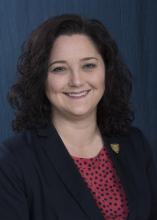Since its establishment in the 1980s, Women’s History Month has taken place each March to encourage the study, observance and celebration of women’s vital impacts on American history.
Such impacts are evident throughout Case Western Reserve’s past and present, from the university’s origins as the Flora Stone Mather College for Women, to the efforts of today’s Flora Stone Mather Center for Women and student groups such as those in the Women’s Coalition.
All can celebrate this month with resources and events from Kelvin Smith Library, and stay tuned to The Daily each Wednesday to get to know some of the many women from across fields who help CWRU excel.
Megan Foradori
PhD candidate
For more than two decades, Megan Foradori’s pursuit of a PhD in nursing has taken her across the county, from Johns Hopkins University in Maryland to North Carolina, Texas and Pennsylvania. Throughout the journey, she’s been focused on identification and treatment of developmental delays in children.
For her dissertation, Foradori studies providers’ efforts to screen and diagnose children with developmental needs, and whether or not they help connect those children with services. She is sourcing data from the National Survey of Children’s Health to find patterns in the children who ultimately receive services—such as speech or behavioral therapies—and those children who are missed.
“Knowing which children do not receive treatment services allows us to better tailor future screening and diagnostic interventions so we can do a better job of finding them in practice,” she said.
Read more about her work in Forefront magazine.
Shanina Knighton (GRS ’17, nursing)
Adjunct associate professor and Veale Faculty Fellow
Shanina Knighton’s research and practice centers on infectious disease prevention. From developing standards and policies to 3D printing new technological devices for hospitals, Knighton has worked countless hours to help patients in an overlooked area: their hands. Viruses and bacteria spread easily through close contact on hospital beds, door knobs and other commonly touched surfaces.
At the height of the COVID-19 pandemic, Knighton and her nurse research colleagues were on the front lines of the healthcare crisis. Educating patients about the benefits of washing their hands, using hand sanitizer and wearing face masks has become her driving passion.
“Nurse scientists bring an important aspect to research and policy in that, while interventions and solutions are being created, our training allows us to see tangible solutions that are often overlooked or undervalued,” she told the Friends of the National Institute of Nursing Research. “While leaders around the world are encouraging the public to clean their hands to prevent germ transmission, my science provides evidence that patients and long-term care residents have germs on their hands, but lack adequate hand hygiene products and are rarely told to practice.”
Knighton was named a Veale Faculty Fellow in August 2023 and hopes to explore entrepreneurial goals of nursing research.
Read more about Knighton’s hand hygiene research in this article.
Melissa Kline
Assistant professor, the Joann Zlotnick Glick Endowed Professor in Community Health Nursing, and senior vice president and system chief nurse executive at The MetroHealth System
Melissa Kline has spent most of her career in nursing identifying ways to better the health of communities around the country. As the recently named Joann Zlotnick Glick Endowed Professor in Community Health Nursing, as well as her capacity as senior vice president and system chief nurse executive at The MetroHealth System, Kline knows the impact nurses can make in the community.
During the COVID-19 pandemic, Kline spearheaded novel ways to help nurses identify Cleveland residents with COVID symptoms before they entered the hospital system. Now, as a member of the nursing school faculty, she’s teaching student nurses new ways of thinking about caring not just for patients, but the community as a whole.
“A commitment to community health—to meeting people where they are—became so much more important coming out of COVID,” said Kline. “I am hopeful our work here will not only help us respond to underserved populations but also to advance our efforts from being reactive to proactive. The partnership between MetroHealth and the School of Nursing will aid in changing nursing education to take on a more preventative approach to improve the health of our community.”
Learn more about Kline in the endowment announcement.
This article was originally published in The Daily as part of Women's history Month 2024.





